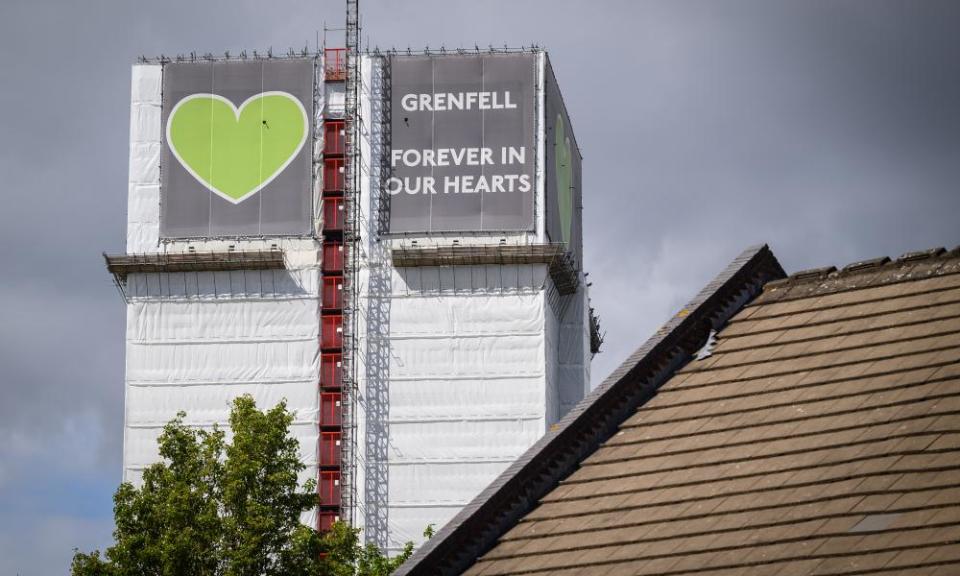Grenfell: councillor was told about cheaper cladding plan before fire

Rock Feilding-Mellen, the Tory councillor in charge of the Grenfell Tower refurbishment, was informed of plans to save money by swapping zinc cladding for aluminium in 2014 but initially told police he only knew about it after the June 2017 fire, a statement released to the public inquiry show.
The switch led to the use of combustible cladding that became the main cause of the fire’s spread. Feilding-Mellen, the cabinet member for housing at the Royal Borough of Kensington and Chelsea in London, said he had no idea about the different properties of the two materials.
In March 2018 he told Scotland Yard detectives investigating the 72 deaths that “issues such as any changes in materials, for example the use of aluminium instead of zinc, was something that I only remember becoming aware of after the fire”.
However, the council’s tenant management organisation told him by email that it was “hoping to achieve savings by negotiating with the planners over the cladding material (aluminium instead of zinc)”. He later confirmed in a police statement and in a witness statement provided to the public inquiry, both of which were published on Monday, that he had received that email but hadn’t picked up on the issue.
The aluminium panels selected saved around £300,000 but contained a plastic core that fuelled the inferno at the 24-storey council block. Feilding-Mellen told the inquiry he did not register the “passing comment” from the TMO about the change, and anyway “didn’t know the difference between aluminium and zinc”. He said he was focused on resolving a dispute about its colour and method of fixing.
Feilding-Mellen is the most senior figure at RBKC to face cross-examination at the public inquiry and said he had no training or expertise in housing or fire safety. He said he relied on the expertise of others during the refurbishment and that he was in the role because he believed the regeneration of council estates was the best way to increase the supply of affordable homes.
“My assumption was that all those people, with their technical understanding, would make sure that anything used on the building would meet the necessary regulations and that the building control process would check that this was the case,” he said.
The counsel to the inquiry, Richard Millett QC, probed his attitude to costs, and the inquiry heard Feilding-Mellen questioned “the sense” of refurbishing the tower given that the council had in 2009 commissioned a masterplan that concluded Grenfell Tower “blights” the area and should be demolished.
In 2013, when RBKC was considering whether to approve a budget increase to £9.7m, Feilding-Mellen queried the budget increase, but was told by the director of housing that no money had been spent on maintaining the tower in 30 years. Feilding-Mellen said it was his duty to check reasons for spending public money.
In 2014, when the TMO was calculating savings from changes to the cladding package, it told its cost consultant: “We need good costs for Cllr Feilding-Mellen.”
Feilding-Mellen told the inquiry that cost was not the priority. “We would have been even more willing to increase the budget had we been told it was necessary to ensure residents’ safety,” he said. “While I was on the cabinet, we were never advised that there might be any conflict between budget constraints and the fire safety of the tower resulting from its refurbishment.”
He apologised for the grief the fire has caused: “I realise that my sympathy is utterly insufficient to make any difference to the heartbreak and pain still being felt by so many; nevertheless, I hope the survivors and the victims’ relatives know how sorry I am that they are suffering such grief.”
He assumed the council’s officers were scrutinising the TMO’s efforts to maintain fire safety in the borough’s housing, but “based on what we know happened, it turned out to be hope rather than knowledge”.
The inquiry continues.
• This article was amended on 28 May 2021 to clarify the timeline of Rock Feilding-Mellen’s statement to police. He made his initial statement in March 2018 (not July as an earlier version of the article suggested) and later confirmed before signing the document (in July 2018) that he had received an email referencing a change of cladding material. The subheading was also amended accordingly.

 Yahoo Finance
Yahoo Finance 